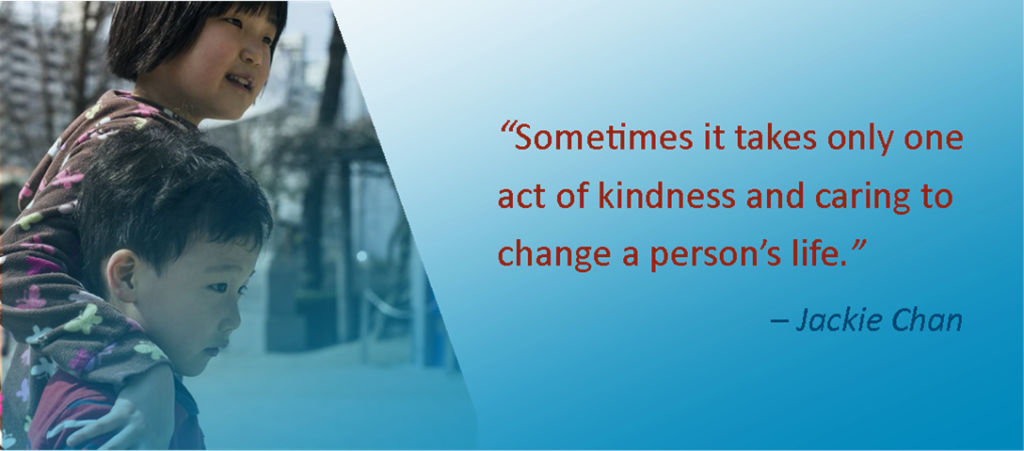
With schools closed and playdates canceled, many children and families are looking for ways to connect with neighbors, their community and the world at large. Moreover, the concerning rise in COVID-19-related xenophobia and anti-Asian incidents can leave children feeling worried for their family’s safety or the safety of others around them. Activities related to immigration, from learning about other cultures to showing support for immigrant essential workers, can be a catalyst for growing connections, promoting empathy and creating a sense of empowerment among children of all ages.
Representation is Important
Providing children with media that positively portrays a diverse range of people is a simple and effective way of promoting equity. Research shows when children see diverse characters in a variety of roles they are less prone to stereotyping, and children who see themselves and their lives accurately represented have higher self-esteem. As one quarter of children in the United States have at least one immigrant parent, positive representations of immigrants are crucially important today.
Many schools and libraries are providing free access to extensive collections of ebooks and audiobooks, but how do you find content your children will enjoy that promotes equity? The Anti-Defamation League’s “Books Matter” collection offers 801 suggestions covering topics from gender to race to religion and more, and each comes with a discussion guide. Online bookseller Alibris has a collection of more than 500 nonfiction children’s books about immigration. There is even a collection of award-winning young adult novels with protagonists from a variety of cultures, from Asian to Latinx to Middle-Eastern, curated by California State University Long Beach.
With many children turning to screens to fill their time, you can help them prioritize shows and games that reinforce compassion. Common Sense Media’s collection of TV shows, games, apps and websites is an excellent resource for preschoolers to teens. Their list of TV shows that inspire empathy helps kids learn the value of putting themselves in someone else’s shoes. The games that support kindness and compassion list helps kids see other viewpoints, celebrate others’ traditions and learn how tough it is to be bullied or discriminated against, and the empathy games, apps and websites list is full of options that teach kids to think about how other people feel and to emphasize the value of human relationships.
Above all, you are the secret ingredient. Engage children and teens in discussions about the importance of diversity and visibility. Encourage them to ask questions about who gets represented and why.
Knowledge is Power
Whether it’s across an ocean, across the country or across town, every family has stories of moving in their history. Hearing family stories about being a newcomer somewhere connects children with their past and can spark compassion for others. To help guide you, Scholastic offers Exploring Family Heritage, a collection of articles and lesson plans for children in grades pre-K through eight. Teaching Tolerance offers a lesson plan for children in grades K through five called Understanding My Family’s History.

Children can learn about the invention of paper and the introduction of a beautiful art form in a virtual tour of the China Paper Cutting Museum. Photo credit: Google Maps
For inspiration, your family can explore Meet Young Immigrants, a collection of stories from Scholastic about children recently arrived in the U.S. The University of Minnesota has collected more than 250 first, second and third generation Immigrant Stories representing more than 50 different communities. If you are feeling ambitious, you can even add your own.
Discussing their own heritage can spark children’s interest in other cultures. You might start with your own family’s heritage, or the home countries of your children’s immigrant friends and classmates. Maybe they’d like to start with learning where your immigrant neighbors are from using this interactive map from the Migration Policy Institute. Once you’ve settled on your destination, you can take your children on virtual tours of many museums and cultural sites around the world. These “field trips” will help make other countries and cultures come alive.
Support is Empowering
Even when homebound, children can actively show support for their immigrant neighbors. Younger children will enjoy decorating our coloring pages about immigrant neighbors and essential workers and proudly displaying them in windows, perhaps next to their “bear hunt” teddy bear.
Older children and teens can learn more about addressing stereotyping and scapegoating. The Anti-Defamation League’s guide to discussing coronavirus and prejudice is a good place to start, and this article from Vox, Why pandemics activate xenophobia, gives the historical and cultural context for a bigger, in-depth discussion.
In addition to the historical context, Facing History’s Coronavirus: protect yourself and stand against racism also offers the scientific perspective. Offering what is currently known by the scientific community, it encourages reflection about the consequences of discrimination. Providing young adults with factually correct information and opportunities to reflect on the consequences of discrimination makes them less likely to pass on false information and encourages them to challenge coronavirus-inspired racism if, or when, they encounter it. Facing History provides techniques for standing up to racist and hateful speech, both online and in person. They also offer tips and best practices that teens can use when participating in online activism. These activities can give your children agency and empower them to create a safer and more welcoming world.
As the pandemic underscores the interconnected and interdependent nature of our global community, it is even more important to instill in our children an understanding and appreciation of the diverse cultures that make up our country and the world. By highlighting immigration, we can cultivate a global mindset, empathetic understanding and, above all, kindness.
Resources Mentioned
For all:
- TV that Inspires Empathy, Common Sense Media
- Games that Support Kindness and Compassion, Common Sense Media
- Diversity in Media and Why Visibility Matters: Family Conversations About Current Events,the Anti-Defamation League
- Exploring Family Heritage, Scholastic
- Immigrant Stories, University of Minnesota Immigration History Research Center
- State Immigration Data Profiles, the Migration Policy Institute
- Check out these virtual tours of museums around the world, TimeOut
- Google Arts & Culture Places
For children:
- Drawing Support, The Immigrant Learning Center
- Books Matter, the Anti-Defamation League
- Children’s Nonfiction Social Issues Emigration Immigration Books, Alibris
- Understanding My Family’s History, Teaching Tolerance
- Meet Young Immigrants, Scholastic
For teens:
- Young Adult Literature: Different Cultures, California State University Long Beach
- The Coronavirus Surfaces Fear, Stereotypes and Scapegoating, Anti-Defamation League
- Why pandemics activate xenophobia, Vox
- Coronavirus: Protect Yourself and Stand Against Racism, Facing History and Ourselves
- Upstanders: Profound Risks, Incredible Rewards, Facing History and Ourselves
- The Voices of Millions (modified version), Facing History and Ourselves
Other Resources:
- Resources for Immigrants, Parents and Educators During COVID-19 Crisis, The Immigrant Learning Center
- Three ways immigrants are fighting COVID-19, The Immigrant Learning Center


